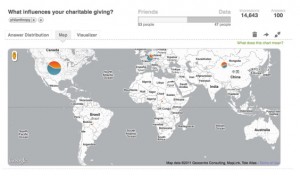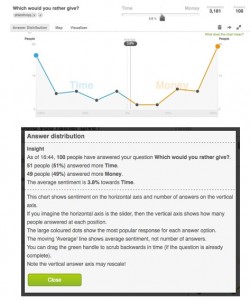I was reading Amy Sample Ward’s blog this morning and she’s posted a brilliant article on Qriously – a new research tool that captures public sentiment in real time through survey style questions asked by replacing sponsored ads with questions in smartphone and tablet apps.
I’m really not able to explain the tool any better than Amy as I’ve never used it, but I have now applied for a trial account, so I’ll summarise the key points and you can click on the link above to read Amy’s blog.
Qriously – sentiment captured in real time:
- You can ask questions in 3 formats: multiple choice – two answer maximum, using a slider bar for the more subjective question, or a star/rating option
- Questions can be set by region – select the location; global, regional or local (if you get a trial account, you are limited to global questions)
- It seems that trial accounts allow you to ask 4 questions and you can gather 100 responses to measure the sentiment for your question
- The reporting shows impressions and answers in real time
- You can view the completed reports in bar graphs, slider bar questions in line graphs to show the representation of the sentiment across the slider bar and global sentiment is represented as pie charts mashed up with a global map – very cool. This allows you to test how sentiment differs based on culture or regional issues of the time. Very useful for a global, not for profit organisation that relies on charitable donations (ie. WWF-Australia)
- Amy gives several idea starters for how this tool could be useful to marketing, campaigning, listening and targeting so check out her blog post here about Qriously and then check out Qriously for yourself!
I have pilfered a few screenshots of Qriously from Amy’s blog for your reference.
Update: 6th June, 2011. Amy has posted a follow up blog post with a case study from Katy Gilbert at Stories of our City, a worldwide social organisation striving to bring people together for world peace (easy task, right). They used Qriously to understand how they can better use social media to connect and spread the peace message.
Katy got some good insights out of it. Qriously raised some barriers that they need to address and clearly showed bias across different parts of the world to the same question. Click here for Qriously case study from Stories of our City.



Do you have a spam issue on this site; I also am a blogger, and I was wondering your situation; we
have created some nice procedures and we are looking to exchange strategies with others, please shoot me an email if interested.